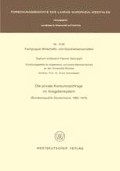Zusammenfassung
Im Jahre 1954 veröffentlichte Stone 1 erstmals die Ergebnisse der empirischen Anwendung eines vollständigen Nachfragesystems, das allen in Abschnitt 3 des vorigen Kapitels dargestellten Restriktionen aus der Theorie der Konsumentennachfrage genügt.
Access this chapter
Tax calculation will be finalised at checkout
Purchases are for personal use only
Preview
Unable to display preview. Download preview PDF.
Hinweise
J.R.N. Stone: Linear Expenditure Systems and Demand Analysis: An Application to the Pattern of British Demand, The Economic Journal 64 (1954), S. 511ff.
Hervorzuheben sind das ‘Rotterdam-Modell’ von Theil und Barten sowie die ‘Addilog-Systems’ von Houthakker: A.P. Barten: Consumer Demand..., a.a.O., S. 1ff. H.S. Houthakker: Additive..., a.a.O., S. 244. H. Theil: The Information Approach to Demand Analysis, Econometrica 33 (1965), S. 67ff.
L.R. Klein, H. Rubin: A Constant-Utility Index of the Cost of Living, Review of Economic Studies 15 (1947/48), S. 84ff.
P.A. Samuelson: Some Implications of “Linearity”, The Review of Economic Studies 15 (1947/48), S. 88ff.
R.C. Geary: A Note on “A Constant-Utility Index of the Cost of Living”, The Review of Economic Studies 18 (1950/51), S. 65f.
R.A. Pollak, T.J. Wales: Estimation of the Linear Expenditure System, Econometrica 37 (1969), S. 611ff.
So zum Beispiel: J.R.N. Stone, J.A.C. Brown, D.A. Rowe: Demand Analysis... a.a.O., S. 208ff. R.A. Pollak, T.J. Wales: Estimation..., a.a.O., S. 620ff.
F. Bekerle: Nachfragesysteme für Österreich — Eine empirische Überprüfung der “Linear-Expenditure” Hypothese, Empirica 1978 Heft 1, S. 3ff.
A. S. Goldberger, T. Gamaletsos: A Cross-Country Comparison of Expenditure Patterns, European Economic Review Vol. 1 (1969), S. 370.
D.W. Marquardt: An Algorithm for Least Squares Estimation of Non-Linear Parameters, Journal of the Society of Industrial and Applied Mathematics Vol. 11 (1963), S. 431ff.
R.W. Parks: Systems of Demand Equations: An Empirical Comparison of Alternative Functional Forms, Econometrica 37 (1969), S. 646.
H. Theil: The Information Approach..., a.a.O., S. 67ff. H. Theil, R.H. Mnookin: The Information Value of Demand Equations and Predictions, The Journal of Politcial Economy 74 (1966), S. 34ff.
Author information
Authors and Affiliations
Rights and permissions
Copyright information
© 1982 Westdeutscher Verlag GmbH, Opladen
About this chapter
Cite this chapter
Steinpaß, P. (1982). Das ‘Linear Expenditure System’. In: Die private Konsumnachfrage im Ausgabensystem. Forschungsberichte des Landes Nordrhein-Westfalen. VS Verlag für Sozialwissenschaften, Wiesbaden. https://doi.org/10.1007/978-3-322-87576-1_3
Download citation
DOI: https://doi.org/10.1007/978-3-322-87576-1_3
Publisher Name: VS Verlag für Sozialwissenschaften, Wiesbaden
Print ISBN: 978-3-531-03140-8
Online ISBN: 978-3-322-87576-1
eBook Packages: Springer Book Archive

